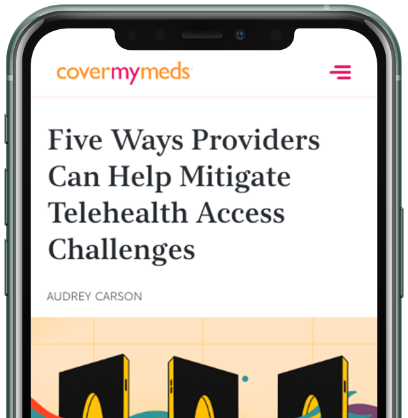How Field Reimbursement Managers Support Pharmaceutical Brands
Explore how Field Reimbursement Managers (FRMs) help bridge complex gaps between pharmaceutical companies, insurers and healthcare providers to simplify medication access and reimbursement.

As the specialty medication landscape becomes increasingly intricate, Field Reimbursement Managers (FRMs) serve as vital liaisons between stakeholders, making connections and expediting processes. Working with healthcare teams to expedite prior authorizations, address claim denials or coordinate appeals processes, whatever the task, the FRM’s focus is always on the patient.
Whether hired in-house or outsourced, FRM support can be especially critical for pharmaceutical brands to improve patient access during the initial months of a product launch. FRMs can also support in-market drugs to address evolving reimbursement challenges.
What are Field Reimbursement Services?
Field reimbursement services are a specialized offering within the healthcare industry focused on helping provider teams navigate the complex landscape of insurance coverage and reimbursement for medications.
"Field reimbursement services reduce time to therapy,” said Harith Jones, Director, Field Operations and Clinical Services. “When you boil it all down, that is the number one goal."
One key area where field reimbursement services provide valuable support is in the "buy-and-bill" model, commonly used for specialty medications. In this model, providers purchase medications upfront and then bill insurance companies for reimbursement after administering them to patients.
This approach carries significant financial risks for providers, as they may be left with substantial losses if payers deny or underpay claims. The stakes are particularly high for new specialty medications, which often come with hefty price tags. If a payer ultimately rejects a claim, the provider is left to absorb the full cost of the medication, potentially discouraging them from offering innovative treatments to their patients.
Field Reimbursement Managers help mitigate the risks of the buy-and-bill model. By working closely with providers to help ensure proper documentation, coding and submission of claims, FRMs increase the likelihood of timely and appropriate reimbursement.
Harith JonesDirector, Field Operations and Clinical Services, CoverMyMeds
What is a Field Reimbursement Manager?
Pharmaceutical brands typically need a team of multiple Field Reimbursement Managers (sometimes called Access Reimbursement Managers) to support their Field Reimbursement Services.
FRMs wear many hats within their role as medication access facilitators. Supporting healthcare providers in a non-sales role, FRMs help expedite patient prior authorizations, address claim denials and coordinate appeals processes.
“Throughout their career, FRMs should stay current with industry trends and the payer landscape,” said Jones. “Your FRMs should be trained in shared rules of engagement, compliance requirements, brand services, product information, therapeutic area details and market access resources.”
Data management and analysis have also become increasingly important in the FRM role. FRMs provide valuable feedback to pharmaceutical brands about market dynamics and access challenges by identifying trends and tracking patient and territory progress. This data-driven approach can allow for more strategic decision-making and resource allocation.
When do pharmaceutical brands engage Field Reimbursement Managers?
Pharmaceutical companies typically scale up Field Reimbursement Services teams at two key phases in a product's lifecycle: During medication go-to-market (GTM), and for ongoing in-market drug lifecycle support.
How FRMs can strengthen new drug launches
In the GTM phase of new drug launches, FRMs can provide comprehensive education on reimbursement processes for new therapies and help ensure accurate and complete claims submissions from the start. FRMs can also:
- Help optimize workflows related to patient therapy access and reimbursement.
- Help identify potential access barriers as payers develop coverage policies.
- Assist with understanding prior authorization requirements.
- Support providers in appealing denials during the early coverage determination period.
- Provide guidance on proper coding and documentation for the new product.
- Support providers in appealing claim denials and short-paid claims.
How FRMs Can Help Reinvigorate In-Market Drugs
For established products, FRMs provide ongoing support to address evolving reimbursement challenges and offer continued education as payer policies change over time. FRMs can be especially helpful with overcoming high denial rates for specific payers or patient populations and support appeals for complex cases or high-cost therapies. FRMs can also:
- Support mature brands in reactivating medication awareness.
- Identify and resolve systemic reimbursement issues impacting patient access.
- Offer continued education on coverage criteria and prior authorization processes.
- Gather real-world insights on access barriers to inform market access strategies.
The pros and cons of insourcing and outsourcing FRMs
The decision to insource or outsource often depends on factors such as company size, portfolio complexity, internal capabilities and strategic priorities. Many companies opt for a hybrid model, maintaining an internal core team supplemented by outsourced FRMs for additional flexibility.
“While outsourcing reduces the time spent managing the FRM function, the upfront evaluation of vendors can require a significant time commitment,” explained Jones. “Strong vendor oversight and performance management is needed, so pharmaceutical brands should look for a vendor with a proven track record in Field Reimbursement Services.”
Pros of Insourcing FRMs
- Allows for direct control over hiring and team management.
- May provide deeper integration with company culture.
- Can support long-term internal knowledge building.
Cons of Insourcing FRMs
- Long start-up time to hire, train and develop internal expertise.
- High bottom line costs for salaries, benefits, and training.
- Less flexibility to scale team size up or down.
Pros of Outsourcing FRMs
- Greater flexibility to scale teams as needed.
- Access to specialized expertise and established training programs.
- May be more cost-effective, especially for smaller brands or launches.
Cons of Outsourcing FRMs
- Less direct control over day-to-day activities of FRMs.
- Potential need for strong vendor oversight and performance management.
- Possible limitations on FRMs’ patient journey visibility and data sharing.
What skill gaps can Reimbursement Managers fill for pharma companies?
FRMs should bring a unique set of skills and knowledge that fill critical gaps for pharmaceutical companies. The expertise of FRMs can complement the efforts of sales teams and other patient support services, creating a more comprehensive approach to supporting patient access and affordability.
- Reimbursement Expertise
FRMs possess deep knowledge of insurance coverage, patient assistance programs and local reimbursement landscapes. Their understanding of these nuances allows them to navigate complex payer systems and policies, helping healthcare providers overcome access barriers that might otherwise prevent patients from starting or continuing necessary specialty drug treatments.
- Non-Sales Support
While sales teams focus on promoting product usage and building relationships with prescribers, FRMs offer specialized education and support for access and reimbursement issues. This division of responsibilities helps to ensure that healthcare providers receive comprehensive support across all aspects of patient care and treatment initiation.
- Patient Journey Insight
FRMs have visibility into the barriers that may prevent timely access to therapies, allowing them to address issues proactively. They understand the complexities of payer policies and can anticipate potential roadblocks, working to prevent them from becoming significant obstacles to patient access.
- Local Market Knowledge
Many FRMs specialize in specific territories or states, providing invaluable local expertise. This granular understanding of regional payer dynamics, state-specific regulations and local healthcare systems allows FRMs to tailor their support to the unique needs of each market.
Duties of Field Reimbursement Managers
A FRM’s work involves a thorough understanding of reimbursement processes and patient support programs. They often work at the patient-level to help resolve reimbursement issues and assist healthcare teams with insurance verifications and prior authorization requests. The following are a few of the tasks a FRM performs on any given workday.
- Pre-planning
A significant part of the FRM role involves the pre-planning and timing of interactions with stakeholders. FRMs act as a liaison between healthcare providers and pharmaceutical companies, coordinating with call centers, specialty pharmacies and payers. This coordination extends to internal collaboration with sales representatives and other teams within the pharmaceutical company.
- Visit Prep
FRMs meticulously review account profiles, prepare relevant materials and conduct payer research before meeting with healthcare providers. They set clear goals and objectives for these visits to help ensure that each interaction is purposeful and productive. Regular communication and participation in team meetings help FRMs stay aligned with overall brand strategies.
- Field Coordination
In the field, FRMs serve as the face of patient support services, building relationships with provider office staff. They coordinate pre- and post-visit activities with various stakeholders, including regular meetings with sales reps. Building strong relationships through face-to-face interactions is crucial, as FRMs become trusted resources for healthcare provider teams.
- Continuing Education
Education is an ongoing aspect of an FRM's role, both for themselves and for the healthcare providers they support. FRMs maintain certifications and attend conferences to stay current with industry trends and best practices. They then share this knowledge with healthcare providers, offering insights into complex reimbursement processes and payer policies.
- Follow-up
Follow-up is a critical component of an FRM's responsibilities. They track patient and territory progress, document activities and identify trends. This data-driven approach allows FRMs to continually refine their strategies and provide valuable feedback to pharmaceutical brands about market dynamics and access challenges.
Whatever the task may be, it's all for the benefit of the patient. “FRMs are advocates – patient advocates, submission advocates,” said Jones. “Through advocacy and education for healthcare teams, FRMs help overcome the barriers that stand between patients and their therapies.”
Break down barriers to access with Field Reimbursement Services
CoverMyMeds provides pharmaceutical companies with comprehensive Field Reimbursement Services to support their brand portfolio. Our Field Reimbursement Managers have the necessary therapeutic and payer expertise and a unique level of patient visibility.
Our scalable teams of FRMs can onboard in as few as two months to extend your brand reach during new launches and beyond. Learn more about CoverMyMeds' Field Reimbursement Services.
The latest healthcare insights, floated right to your inbox.



